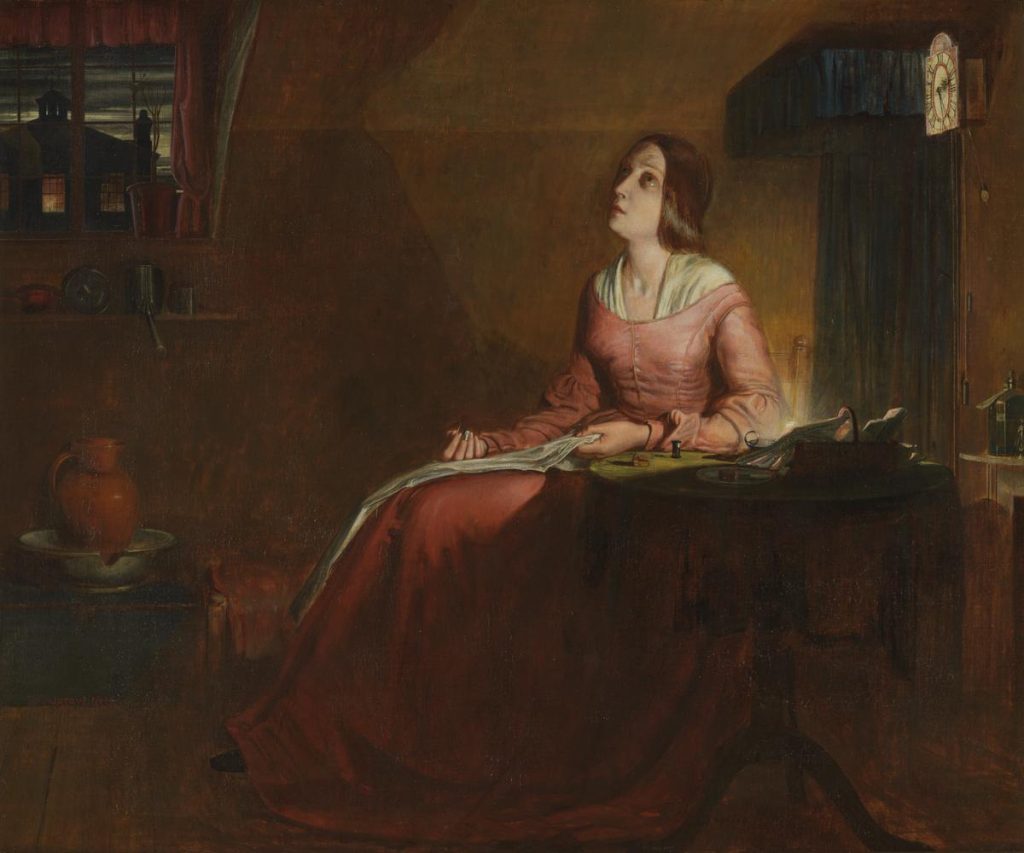Thomas Hood (1799-1845)
“Song of the Shirt” (1843)
“Distressed Needlewomen” in Art: Richard Redgrave, The Sempstress (1844)

This painting was exhibited at the Royal Academy in 1844. Accompanying the painting were lines 25-28 from Thomas Hood’s “Song of the Shirt”:
“O, men, with sisters dear!
O, men, with mothers and wives!
It is not linen you’re wearing out,
But human creatures’ lives!
The success of the image was largely due to Redgrave’s presentation of the sempstress as a victim in need of salvation. The woman’s pleading expression and posture evoke standard representations of the penitent Magdalene in Old Master painting.
Text is a remix of https://www.tate.org.uk/art/artworks/redgrave-the-sempstress-t14166
“Distressed Needlewomen” in Art: Anna Blunden, “The Seamstress” (1854)

“Distressed Needlewomen” in Art: Beatrice Offor, “It is not the linen you’re wearing out, but human creatures’ lives” (c. 1907-1917)

With fingers weary and worn,
With eyelids heavy and red,
A woman sat in unwomanly rags,
Plying her needle and thread—
Stitch! stitch! stitch!
In poverty, hunger, and dirt,
And still with a voice of dolorous pitch
She sang the “Song of the Shirt.”
“Work! work! work!
While the cock is crowing aloof! 10
And work—work—work,
Till the stars shine through the roof!
It’s O! to be a slave
Along with the barbarous Turk,
Where woman has never a soul to save,
If this is Christian work!
“Work—work—work,
Till the brain begins to swim;
Work—work—work,
Till the eyes are heavy and dim! 20
Seam, and gusset, and band,
Band, and gusset, and seam,
Till over the buttons I fall asleep,
And sew them on in a dream!
“O, men, with sisters dear!
O, men, with mothers and wives!
It is not linen you’re wearing out,
But human creatures’ lives!
Stitch—stitch—stitch,
In poverty, hunger and dirt, 30
Sewing at once, with a double thread,
A Shroud as well as a Shirt.
“But why do I talk of death?
That phantom of grisly bone,
I hardly fear his terrible shape,
It seems so like my own—
It seems so like my own,
Because of the fasts I keep;
Oh, God! that bread should be so dear.
And flesh and blood so cheap! 40
“Work—work—work!
My labour never flags;
And what are its wages? A bed of straw,
A crust of bread—and rags.
That shattered roof—this naked floor—
A table—a broken chair—
And a wall so blank, my shadow I thank
For sometimes falling there!
“Work—work—work!
From weary chime to chime, 50
Work—work—work,
As prisoners work for crime!
Band, and gusset, and seam,
Seam, and gusset, and band,
Till the heart is sick, and the brain benumbed,
As well as the weary hand.
“Work—work—work,
In the dull December light,
And work—work—work,
When the weather is warm and bright— 60
While underneath the eaves
The brooding swallows cling
As if to show me their sunny backs
And twit me with the spring.
“O! but to breathe the breath
Of the cowslip and primrose sweet—
With the sky above my head,
And the grass beneath my feet;
For only one short hour
To feel as I used to feel, 70
Before I knew the woes of want
And the walk that costs a meal!
“O! but for one short hour!
A respite however brief!
No blessed leisure for Love or hope,
But only time for grief!
A little weeping would ease my heart,
But in their briny bed
My tears must stop, for every drop
Hinders needle and thread!” 80
With fingers weary and worn,
With eyelids heavy and red,
A woman sat in unwomanly rags,
Plying her needle and thread—
Stitch! stitch! stitch!
In poverty, hunger, and dirt,
And still with a voice of dolorous pitch,—
Would that its tone could reach the Rich!—
She sang this “Song of the Shirt!”

